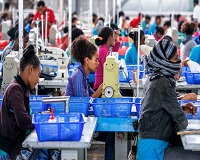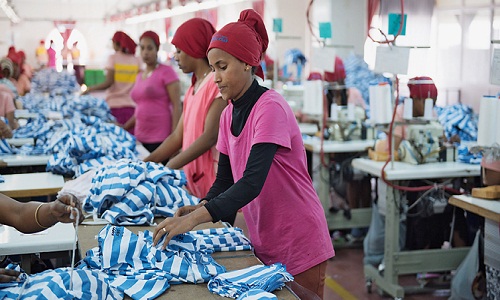"In order to boost its economy by 2025, Ethiopia has devised a well-crafted strategy where textile forms one of the crucial components of the economy. These efforts seemed to have paid off well with Ethiopia ranking seventh most attractive African country for investors as per Africa Investment Index (AII) 2018. Backed by a rapidly growing economy, a huge population of over hundred million, proximity to major international markets, conducive policy environment and a rapidly improving infrastructure, it has become a favorable destination for foreign investors. In fact, many companies have shifted their manufacturing units from countries such as Turkey, India and China to Ethiopia over the past decade. Moreover, many European and American companies are expanding their presence in the region."
 In order to boost its economy by 2025, Ethiopia has devised a well-crafted strategy where textile forms one of the crucial components of the economy. These efforts seemed to have paid off well with Ethiopia ranking seventh most attractive African country for investors as per Africa Investment Index (AII) 2018. Backed by a rapidly growing economy, a huge population of over hundred million, proximity to major international markets, conducive policy environment and a rapidly improving infrastructure, it has become a favorable destination for foreign investors. In fact, many companies have shifted their manufacturing units from countries such as Turkey, India and China to Ethiopia over the past decade. Moreover, many European and American companies are expanding their presence in the region.
In order to boost its economy by 2025, Ethiopia has devised a well-crafted strategy where textile forms one of the crucial components of the economy. These efforts seemed to have paid off well with Ethiopia ranking seventh most attractive African country for investors as per Africa Investment Index (AII) 2018. Backed by a rapidly growing economy, a huge population of over hundred million, proximity to major international markets, conducive policy environment and a rapidly improving infrastructure, it has become a favorable destination for foreign investors. In fact, many companies have shifted their manufacturing units from countries such as Turkey, India and China to Ethiopia over the past decade. Moreover, many European and American companies are expanding their presence in the region.
Political stability a big plus
With IMF forecasting economic growth at 8.5 per cent for the next year, Ethiopia is expected to consolidate its position as the fastest growing economy in Africa. As per IMF, the country also had an average of 10 per cent economic growth over the past few years. Various factors are aiding growth. One, is the political stability. The popularity of new prime minister, Abiy Ahmed and the sense of unity he has stimulated among people has given a boost to growth.
position as the fastest growing economy in Africa. As per IMF, the country also had an average of 10 per cent economic growth over the past few years. Various factors are aiding growth. One, is the political stability. The popularity of new prime minister, Abiy Ahmed and the sense of unity he has stimulated among people has given a boost to growth.
A recent CNN report states, Ethiopia is now Africa’s fastest growing economy. Vijaya Ramachandran, Economist, Center for Global Development (CGD), credits Ethiopia's growth to government efforts to boost industrial production and manufacturing. The report mentions Ethiopia can follow China’s footsteps, and become a destination for low-wage manufacturing jobs. Categorising African states into three in terms of their income levels, the first group consists of solidly middle-income countries. This group includes South Africa and Botswana, which are characterised by very high labour costs and capital intensive industries. The second group includes leading low and lower-middle lower-income African countries like Kenya, Tanzania and Senegal – coastal, relatively stable, and with a strong business sector. These countries have relatively costly labour compared to countries like Bangladesh. The third group consists of countries at the very low end of the income spectrum, so poor that there are almost no real comparators.
Though landlocked, Ethiopia is making efforts to work on logistics constraints through road and rail connections; it also has good air connections. It has a stable administration that sees the manufacturing as a central part of its growth strategy. It also benefits from generally low costs. As measured by Purchasing-Power Parity, the general level of prices in Ethiopia is below the level in India and comparable to that of in Bangladesh.
Labour costs
Higher labour prices and problems of poor working conditions in Asian industrial locations are major pull factors for the region. Ethiopia has lower labour wages and better working conditions than the countries with reputation for poor working conditions. In the International Trade Union Global Rights Index, Ethiopia fared better than Mexico and Malaysia. There have, however, been health and safety concerns in some instances. As per the report, there are no restrictive labour laws in Ethiopia, which is meant to show that companies have relatively bigger room to manipulate labour. These conditions need to be improved. With so many positives by its side, Ethiopia is sure to grab the global manufacturing attention.












